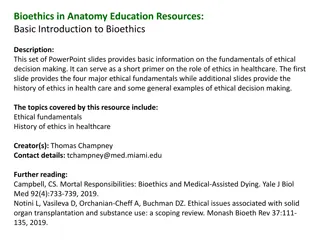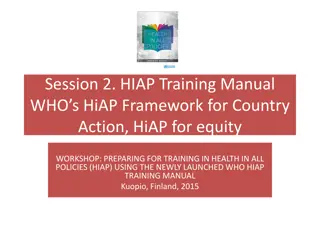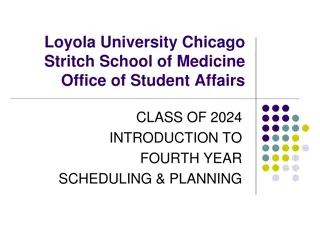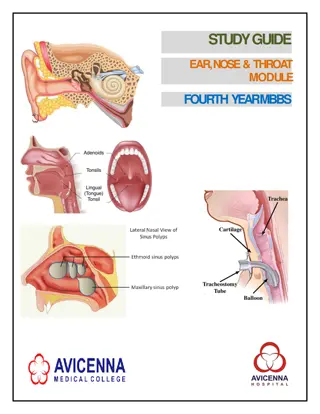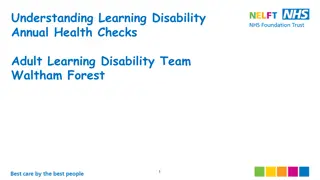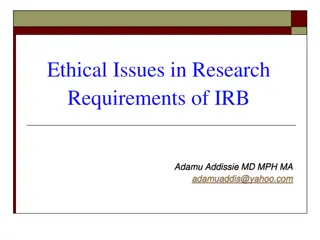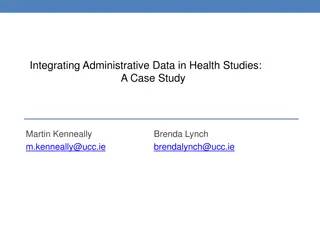
Bioethics at Summa Health - Roles and Initiatives
Discover the diverse functions of bioethics at Summa Health, including education, policy development, and ethical consultation services. Explore the structure of the ethics committee, the expertise of the bioethicist, and common clinical ethics issues faced in healthcare settings.
Download Presentation

Please find below an Image/Link to download the presentation.
The content on the website is provided AS IS for your information and personal use only. It may not be sold, licensed, or shared on other websites without obtaining consent from the author. If you encounter any issues during the download, it is possible that the publisher has removed the file from their server.
You are allowed to download the files provided on this website for personal or commercial use, subject to the condition that they are used lawfully. All files are the property of their respective owners.
The content on the website is provided AS IS for your information and personal use only. It may not be sold, licensed, or shared on other websites without obtaining consent from the author.
E N D
Presentation Transcript
Bioethics at Summa Health Amanda K. Booher, PhD Bioethicist
Agenda Bioethics at Summa Types and process of consults Case Study Comments/Questions 06.06.2016
Functions of Ethics at Summa Provide educational support to patients, community, and staff on bioethical issues within the hospitals and community. Develop and refer resources to assist in resolving ethical dilemmas identified by patients, families, and patient care providers. Serve as liaison to community and statewide bioethics networks. Develop and evaluate policies, procedures, and practices around the Hospitals effectiveness in respecting patient rights and resolving ethical dilemmas. Advise the Hospital Board, or Board designated committee, on ethical policies, procedures, and practices relating to patient care. Serve as a consultative resource in resolving ethical matters. 3
From Fox, E., Bottrell, M. M., Berkowitz, K.A., Chanko B.L., Foglia, M.B., Pearlman, R.A. (2010). IntegrateEthics: An Innovative Program to Improve Ethics Quality in Health Care. The Innovation Journal: The Public Sector Innovation Journal, 15(2). https://www.ethics.va.gov/IEov erview.pdf IntegratedEthics Authors from National Center for Ethics in Health Care, Department of Veterans Affairs, USA 4
Ethics Committee Structure 19 voting members Bioethicists Physician Nursing Transitional care/social work Legal Pastoral care Community members Non-voting members/attendees oResident representatives oPalliative care fellows oMedical students Committee meetings occur 4thTuesday of every other month Separate committees at Akron City and Barberton Chair: Rebecca Teagarden, DO, MA Vice-Chair: Jennifer Drost, DO, MPH 5
Bioethicist That's me. I really like school. MA in Ethics (CWRU) PhD in Rhetoric, Communication & Information Design (Clemson University) MA/BA English (CWRU) Research Interests: Bodies, technology, disability, bioethics, health equity, reproductive health, correctional health, neuroethics Teaching: Theory, Professional/Medical/Scientific/Technical Writing Summa Consults Education Policy etc. 6
Common Clinical Ethics Issues Conflict resolution Decision making capacity Decision making capacity for unrepresented patient Determining appropriate surrogate Discharge planning DNR End of life Explanation/discussion of options Finding Family Informed Consent Non-adherence Values clarification Other (please specify) 7
Common Services We Consult Legal Palliative Care Patient Experience Spiritual Care 8 06.06.2016 Summa Health Sample Preso
Policies Nonbeneficial Treatment Conflict Resolution Guidelines for Management of Adult Patients Lacking Decision Making Capacity
Clinical Ethics Consultation Place an order in Epic Page PerfectServe Group Summa Health Ethics No need to wait for a crisis to call! General Questions: x53677 boohera@summahealth.org 10
Case Study 11
Case Study Mrs. A is a 90yo German woman admitted for acute and subacute hip fractures after falling in her home. She has dementia and is almost non-verbal; she speaks German and English (though not well). Mrs. A is non-ambulatory and has had multiple falls at home. Mrs. A's husband is a 93yo Turkish man who also has a dementia diagnosis (he is also a pt at this hospital). He is reported to be HCPOA, though there is no paperwork. The A's adult children have not been involved in their lives for @15 years. They have been cared for by their adult granddaughter for the past 10+ years for @10hr/day. 12
What happens when ethics is consulted? 13
What happens in an Ethics Consult? Collect information o Chart Review o Conversations with involved hospital parties Physicians Residents APRN/PA/etc Nurses SW/TCCs o Possible conversations with patients and families o Consideration of other relevant consults Pastoral Care Legal 14 Determine relevant ethical and other issues Continue to collect information Consult with others on Ethics Committee as needed Formulate recommendations Communicate recommendations to the team/patients (as appropriate) Communicate recommendations through a chart not
Decisions to be Made Treatment: Surgical interventions are available for Mrs. A oMrs. A has no thoughts on surgery oBoth her husband and her granddaughter are opposed to surgical interventions Discharge: the medical team wants Mrs. A discharged to a SNF oMrs. A repeatedly states that she wants to go home oMr. A also wants Mrs. A to go home oGranddaughter (caregiver) wants Mrs. A to go to a SNF What do you do? 15 06.01.2016
Principles of Biomedical Ethics Issues in this Case Autonomy Beneficence Non-Maleficence Justice Capacity/Competency NOK/Surrogacy Appropriateness of Surrogate Safe Discharge How might we consider and balance these in this case? 16
Questions: Decision-Making Capacity Mrs. A seems to lack decision- making capacity for major decisions, but she has not been formally assessed, and there are no notes in the chart. How do we assess capacity? 17
Informed Consent and Capacity 18 06.06.2016
Informed Consent Elements of Informed Consent: 1. Capacity 2. Voluntariness 3. Disclosure 4. Recommendation 5. Understanding 6. Decision 7. Authorization 19 06.06.2016
Informed Consent Elements of Informed Consent: 1. Capacity 2. Voluntariness 3. Disclosure 4. Recommendation 5. Understanding 6. Decision 7. Authorization No undue constraints or coercion 20 06.06.2016
Informed Consent Elements of Informed Consent: 1. Capacity 2. Voluntariness 3. Disclosure 4. Recommendation 5. Understanding 6. Decision 7. Authorization Relevant risks and benefits are disclosed to the patient. 21 06.06.2016
Informed Consent Elements of Informed Consent: 1. Capacity 2. Voluntariness 3. Disclosure 4. Recommendation 5. Understanding 6. Decision 7. Authorization Providers have an ethical obligation to give a recommendation (The patient can accept or reject it) 22 06.06.2016
Informed Consent Elements of Informed Consent: Pt's understanding should include: Diagnoses Prognoses Nature and purpose of intervention Alternatives Risks Benefits Recommendation Terms of authorization 1. Capacity 2. Voluntariness 3. Disclosure 4. Recommendation 5. Understanding 6. Decision 7. Authorization 23 06.06.2016
Informed Consent Elements of Informed Consent: 1. Capacity 2. Voluntariness 3. Disclosure 4. Recommendation 5. Understanding 6. Decision 7. Authorization The pt should express or communicate a decision 24 06.06.2016
Informed Consent Elements of Informed Consent: 1. Capacity 2. Voluntariness 3. Disclosure 4. Recommendation 5. Understanding 6. Decision 7. Authorization The pt provides authorization 25 06.06.2016
Informed Refusal Elements of Informed Refusal (or "declination"): 1. Capacity 2. Voluntariness 3. Disclosure 4. Recommendation 5. Understanding 6. Decision 7. Authorization 26 06.06.2016
Informed Consent Elements of Informed Consent: Standards of capacity in a medical setting: Pt can understand therapeutic or research procedure/intervention Pt can deliberate re: its major risks & benefits (and understands consequences of procedure and no procedure) Pt can make a decision in light of this deliberation (taking into consideration other values) Pt can (and does) communicate a preference or choice 1. Capacity 2. Voluntariness 3. Disclosure 4. Recommendation 5. Understanding 6. Decision 7. Authorization 27 06.06.2016
Informed Consent Elements of Informed Consent: A patient lacks capacity if they lack any of the following: Ability to understand the medical situation and its consequences Ability to understand relevant information Ability to give a rational risk/benefit-related reason Ability to make a reasonable decision Ability (or willingness?) to express or communicate a preference or choice 1. Capacity 2. Voluntariness 3. Disclosure 4. Recommendation 5. Understanding 6. Decision 7. Authorization 28 06.06.2016
Capacity Is Not Competency 29 06.06.2016
Capacity Capacity is decision- and context-specific. The level of capacity required for a decision varies with the complexity and difficulty of the decision. The level of evidence required to determine whether a patient has the capacity for a decision varies with the risk associated with the decision. 30 06.06.2016
Capacity vs. Competency Capacity Competency Determination made by a provider Determination made by a judge Permanent, unless overturned by a judge Can wax and wane Decision-specific Ability-specific 31 06.06.2016
Aid to Capacity Evaluation ACE: Joint Centre for Bioethics Ethics, University of Toronto https://jcb.utoronto.ca/wp-content/uploads/2021/03/ace.pdf 32
Assessment of Patients Competence to Consent to Treatment Paul S. Appelbaum, N Engl J Med 2007; 367: 1834-1840. http://www.nejm.org/doi/pdf/10.105 6/NEJMcp074045 33
Questions: If Mrs. A lacks capacity, who is her surrogate? 34
HCPOA, NOK, and Surrogacy 35
Health Care Power of Attorney (HCPOA) Document in which an individual designates a surrogate to make medical decisions for her if she is incapacitated o the patient need not be terminally ill or in a permanently unconscious state for the HCPOA to make decisions for her o HCPOA relevant for all decisions, not just those regarding life-sustaining nutrition, hydration and respiration 36
DPOA vs HCPOA DPOA someone you designate to handle financial matters if you become incapacitated Chapter 1337 - Ohio Revised Code | Ohio Laws HCPOA someone you designate to handle medical decisions if you become incapacitated (sometimes called Durable Power of Attorney for Health Care - DPOAHC) Chapter 1337 - Ohio Revised Code | Ohio Laws 37
Ohio Next-of-Kin Hierarchy (Section 2133.08 - Ohio Revised Code | Ohio Laws) (1) If any, the guardian of the patient. This division does not permit or require, and shall not be construed as permitting or requiring, the appointment of a guardian for the patient. (2) The patient s spouse; (3) An adult child of the patient or, if there is more than one adult child, a majority of the patient s adult children who are available within a reasonable period of time for consultation with the patient s attending physician; (4) The patient s parents; (5) An adult sibling of the patient or, if there is more than one adult sibling, a majority of the patient s adult siblings who are available within a reasonable period of time for such consultation; (6) The nearest adult who is not described in divisions (1) to (5) of this section, who is related to the patient by blood or adoption, and who is available within a reasonable period of time for such consultation. 38
Surrogate Decision Making SURROGATES DO NOT HAVE CARTE BLANCHE DECISION MAKING AUTHORITY 39
Surrogate Decision Making When we talk about surrogate decision making, we should talk about their assisting with decision making, not about their making decisions. ...the surrogate may participate in decision-making on behalf of the patient 40
Surrogate Decision Making Patients and surrogates accept or decline treatment. Health care professionals are not necessarily required to perform any intervention that is requested by a patient or surrogate. 41
Surrogate Decision Making Decisions should be made: 1.Based on patient s previously expressed wishes (what they have said they wanted when capacitated) 1.Based on substituted judgment (what we think they would have wanted based on values, goals, beliefs, etc. 1.Based on best interests (what would be in the patient's best interest in these particular circumstances based on their values, goals, etc, standard societal values (subjective), and medical judgment) 42
Surrogate Decision Making If the surrogate is not making decisions consistent with one of these three methods, then the medical team may intervene. 43
Possible Surrogates for Mrs. A 44
Surrogacy Questions Patient s husband, Mr. A's: oMr. A's dementia diagnosis; oMr. A is reported to be very domineering; nurse states, "If they weren't related by blood, I would report the grandfather for human trafficking of his granddaughter." Mrs. & Mr. A's adult children: ohave been uninvolved in their parents' lives for 15yrs oOne child has been reported to have said they are just waiting around for their parents to die so they can collect life insurance Mrs. A's Granddaughter: oQuit her job to care for grandparents 10yrs ago; spends 10hrs/day oHas a 4yo and is exhausted oHas had a hysterectomy and shouldn't be doing any heavy lifting 45
Ethical Considerations and Recommendations Does Mrs. A have decision-making capacity re: discharge? oIf so, then we respect her decision. oIf not, then we move to surrogate oIf HCPOA, then paperwork needs to be uploaded to chart oIf not, then NOK 46
Ethical Considerations and Recommendations What makes an inappropriate surrogate? Unable or unwilling to serve Not acting based on patient's stated or perceived wishes Not acting in the patient's best interest Surrogates do NOT have carte-blanche decision-making Standard for stepping over NOK is pretty high 47
Recommendation from Ethics 48
Ethics Recommendation Recommendation If Mrs. A has decision-making capacity re: discharge, and wishes to leave AMA, we should respect her decision. Finding Mrs. A home support for her needs would be ideal. If Mrs. A lacks decision-making capacity, then an appropriate surrogate should be secured to participate in decision making on her behalf If HCPOA paperwork is available, it should be uploaded to the patient s chart. Otherwise, the team should look to the NOK hierarchy to secure a surrogate. For any potential surrogate, the team should assess that individual s ability to participate in decision-making on the patient s behalf. If a potential surrogate lacks the capacity to participate in medical decision-making on the patient s behalf, an alternative surrogate should be sought. Once a willing and appropriate surrogate is secured, if that surrogate is advocating for what the team considers to be an unsafe discharge, then we encourage the team to reconsult ethics. 49
Advance Directives Legal directives completed by an individual in order to ensure that her wishes regarding medical treatment are known and respected. They are meant to protect patient autonomy. o Living Will o Health Care Power of Attorney o Declaration for Mental Health Treatment Disability Rights Ohio - Advance Directives 50



